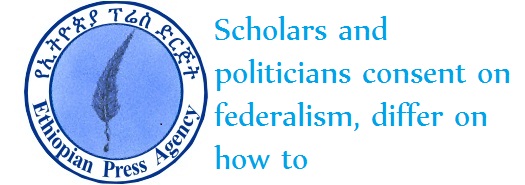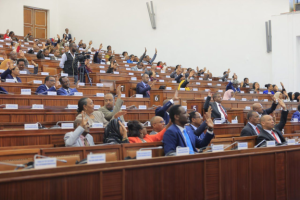
No matter how small were the skirmishes that occurred in some parts of the country, they were potentially enough to alarm the nation and stock fears in the public. That was because the contexts or the pretexts they had been attached with were somehow related to ethnicity (or call it nationality).
It was so alarming for the public that even ordinary citizens were constantly heard blaming the existing ethnically structured federal system as the root cause of such a problem. In the political and the academic arena, the situation is much different.
The question as to whether the existing federal system is to blame or not; or as to whether the system should be sustained with much more enforcement or amended or even scraped all together has remained to be high on the agenda and remained to be as contentious as decades ago.
The answer for this fundamental question depends on who the speaker is. Ethiopia pursued federal system of government following the adoption of the Federal Democratic Republic of Ethiopia (FDRE) Constitution in 1995. Article 46 Sub Article 2 of the constitution enshrines “States shall be delimited on the basis of the settlement patterns, language, identity and consent of the peoples concerned.”
It was this Constitution that recast the country from a centrally unified republic to a federation of nine regional states and two federally administered city-states Some politicians and scholars insist on restructuring the existing federal system from ethnically based division into geographic one, blaming the current system as a potential source of conflict and eventual disintegration of the nation.
On the other hand, other scholars and politicians argue that there is no need to change the current federal system into geographic or territorial division. For them the most important thing is to rectify some errors that happened in its application. Law and Governance Lecturer at Addis Ababa University Dr. Sisay Mengestie told The Ethiopian Herald said that federalism is the only alternative structural system for countries home to various nations and nationalities that have a strong tradition of living together in tolerance.
According to Sisay, federal system has two distinct structures of administrations, namely, ethnic based federalism and territorial or geographic based federalism; both are ongoing in many countries. However, the way of implementing the system differs from one country to the other.
Those countries that implemented the system properly have benefited from it, while the others that went wrong suffered from conflicts and disintegration of people within a nation, he noted. The system which Ethiopia started more than 20 years ago fails to display distinct characteristics as it reflects both ethnic and multinational natures. In this regard, most of the regions of Oromia, Amhara, Somalia, Afar and the likes are structured on ethical base, while the states of Southern Nation, Nationality and People regions (SNNP), Gambella, and the likes are home to various nationalities.
For Sisay, both the existing murky federal structure and improper ways of implementation are major serious factors that hampered an effective federal system in Ethiopia. In addition to this, unfair distribution of resources and interference made by federal government on state matters were other major problems causing some conflicts in some parts of the country over the last four years.
The Constitution, which allows people to nurture their languages and culture is crucial to realizing diversity in the country. Therefore it is not advisable to change the structure into territorial. It is rather necessary to encourage cultural diversity among various nations and nationalities in the country, reduce conflict, and ensure sustainable peace. In addition to this, ensure fair distribution of resources, sharing of power, developing democratic culture and avoidance of interference would play significant role for realizing national consensus across the nation, Sisay underline.
Department of Public and International Relation Head at Dire Dawa University Assistance Prof. Faji Challa argues that any of the two types of federal systems can be plausible for the country provided it is applied properly. However it is difficult to say that there is a fine line between ethnic or multinational federalism in Ethiopia as the system reflects characteristics of more than one federal system.
According to Faji, the country’s federal system gives states power to administer their own affairs within regions delineated based on settlement pattern and interest of the communities. Concerning the accusations on the system as the cause of ethnic conflict in the country he rather argued that the existence of irresponsible leaders is serious problem of the nation and causes of conflict in some part of the country during the past few years.
Even though, both federal structures have some common characteristics, while languages and ethnic identities are not reflected in territorial federalism, it is rather how the environment is comfortable for administer.
He advises that homogeneity should be given priority, rather than changing the federal system in Ethiopia. Homogeneity does not mean that living with the absences of difference; it is rather people have common icon through historical and ideological unity on nation’s matter. It is playing vital role to realize national consensus, increasing social interaction, common goal achievement, enhancing democratic culture, and sustainable peace, while it needs effective political commitment across the country. President of Raey Party Teshale Sebro on his part said that federal system realizes the existence of more than one state power structure.
Although, the existence of different languages, culture, nation, nationality are among some significant advantages to implement a federal system in Ethiopia, persistence of effective federal system was questionable in the country during the last 20 years due to various reasons. According to Teshale, the absence of clear definition regarding what nations, nationalities and peoples by itself mean, irresponsible leaders and the system of structure, among others are major causes of ethnic conflict during the ruling party period.
Due to this reasons and others, Teshale noted that the system should be converted in to a territorial one. As to him, territorial based federalism is better for Ethiopia through classifying in five demarcated areas, the north, south, east, west, and central part of the country.
That will play a significant role in reducing conflicts, ensuring sustainable peace, and avoiding scramble of resources. However, it doesn’t mean that territorial federalism is not without threat; it is rather the degree of the threat, which is smaller than that of ethnic based or multinational federal system, although effective implementation of the system is vital to achieve the goal. For Teshale, political discussion plays a significant role so as to obtain the root causes of ethnic conflict, it was also vital to gain the half solution of the occurrence problems within the nation.
Herald January 12/2019
BY MESERET BEHAILU




